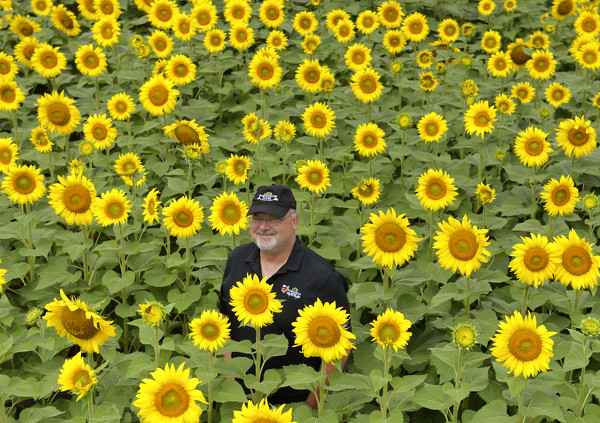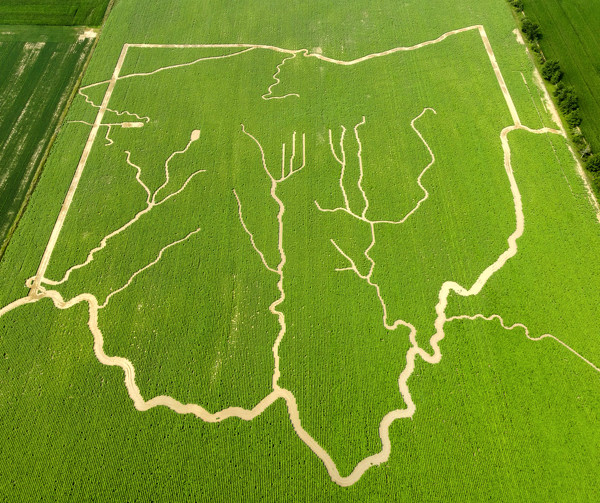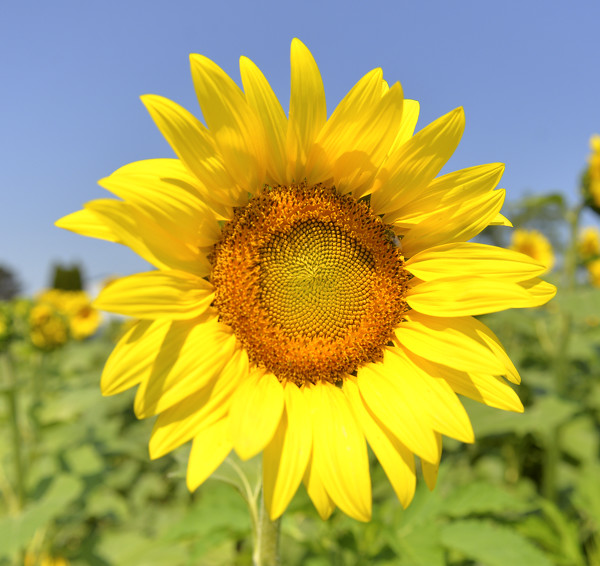
Schoolhouse Farms co-owner Vaughn Davis stands in a sunflower field Monday morning near Rockford. The 2021 Schoolhouse Farms' In Bloom Festival runs Thursday through Sunday.
ROCKFORD - The outskirts of Rockford are awash wiyh yellow, which means Schoolhouse Farm's signature crop has blossomed.
Located at 5468 Ross Road, the farm specializes in sunflowers, which will be on full display Thursday through Sunday during the farm's annual In Bloom Festival.
New this year is the addition of lavender, a labor-intensive perennial crop that farmer and co-owner Vaughn Davis said will be a wonderful addition to the operation.
Davis started the farm with friend and co-owner Beth Cole in 2016. The two started their venture because of their shared love of bird watching and Davis' proclivity for agriculture.
Schoolhouse Farms grows four different types of sunflowers, a variety of heirloom corn and will have their first crop of lavender in about a year, Davis said.
The farm gets its namesake from the one-room Frysinger School located on the premises. Built in 1862, the school functioned during the Civil War and closed in 1939 as the U.S. approached World War II, Davis said. Davis' great-grandmother Cecil Rickard attended the school in the early 20th century, he said.
Davis' father, Lowell, acquired the Ross Road property and the Frysinger School in 1975, and in 2010 a restoration of the school house was undertaken. The school is now used as a farm office. Davis hopes to eventually turn the schoolhouse into an event hall and an educational center where customers can learn more about sunflowers and the items produced by Schoolhouse Farms.
The farm started with eight acres of sunflowers their first year, Davis said. Davis and Cole have seen considerable growth on the farm in the past five years, with around 160 acres of sunflowers and 200 acres of corn and soybeans apiece. The majority of their sunflowers are used for birdseed, Davis said. Eighty acres are dedicated to birdseed alone.
The business has a small processing facility inside a repurposed mill on the Salmon Falls River in Maine where they press their own sunflower oil. They also recently acquired 58 acres of farmland in Oregon to grow sunflowers, Davis said.

There is a 23-acre walkable hydrological map of Ohio on Vaughn Davis' sunflower farm, the site of the Schoolhouse Farms In Bloom Festival near Rockford.
At the Ohio farm, 57 acres of sunflowers are grown for oil and birdseed, while the remaining acreage is intended for customers to pick themselves and floral market sunflowers. Last year, Cole said they sold about 350,000 pounds of sunflowers.
Davis plants about 26,000 sunflower seeds in each acre in the hopes of yielding about 24,000 sunflowers. Some may be eaten by deer or goldfinches, he said, which are the most common pests he gets. There aren't many ways to prevent animals from snacking on the seeds, Davis said, so he plants in high numbers.
Sunflowers get planted in the spring, typically between mid-April and mid-June, Davis said. Like many producers, Davis rotates his crops. His ideal rotation is a sunflower-soybean-corn rotation, he said.
Sunflower seeds are very light, so adjusting a planter accordingly is critical to prevent skips or double plantings, Davis said. He relies a lot on the work of the University of Nebraska for planting sunflowers, Davis said.
Sunflowers don't require a lot of fertilizer. Depending on the crop rotation, the fields may not even need to be fertilized, he said.
"This year I didn't fertilize them at all," he said. "Sunflower roots can go down to about 12 feet, so I rely on the sunflowers to go get the nutrients that went out of the root zone of soybeans and corn from the years before."

A Double Quick Sunflower shines in the summer sun at Schoolhouse Farms near Rockford.
Most sunflowers are grown in a region from west Texas to North Dakota, Davis said, so the plants are typically found in hot, arid climates that require irrigation.
However, Mercer County's rich soil serves the flowers well, and the area also receives adequate rainfall. Davis said his sunflowers tend to do well regardless of whether a summer is wetter or drier than normal.
"I think most people would consider last year (2020) really dry," Davis said. "Last year we grew sunflowers in a new area … on that (new) field of sunflowers, we set a record for pounds per acre."
Two important aspects of growing sunflowers are good seed to soil contact and spacing the plants far enough apart to keep wind moving between them, he said.
Sunflowers have a difficult time drying down, Davis said, and Ohio's humid summers don't do the flowers any favors. Sunflowers need a moisture content lower than 14% when drying out the seeds, otherwise growers risk mildew forming in storage. Planting the flowers far enough apart for proper air circulation can help keep them dry, he said.
Outside of the original sunflower operation, the pair in recent years have started growing heirloom corn. Heirloom or heritage crops are produced with seeds that are open-pollinated by natural means, such as birds or insects, and retain their original traits from one generation to the next.
Davis aimed to grow heirloom corn that would have been grown in the area at the time the Frysinger School was started in 1862.
Davis said when they first started growing heirloom corn, he had to purchase the heirloom seeds, which were extremely expensive. He said he believes it a worthwhile investment.
After growing enough seed corn in the first year to plant a reasonable amount the second year, Schoolhouse Farms now gets new seeds each year from the previous year's harvest without purchasing new seeds.
"Our seed cost every year now is zero," Davis said of their heirloom corn.
The heirloom corn is used for gourmet popcorn, cornmeal and more recently to produce alcohol. Cole said Schoolhouse Farms has found customers in four different distilleries, which use their heirloom corn for moonshine, whiskey and other corn liquors.
The newest addition to the farmstead is lavender. Davis, Cole and a handful of volunteers painstakingly planted each of their 1,600 lavender starts by hand in April.
Lavender is a labor-intensive perennial herb, which Davis said means the plants that survives over the winter will produce blooms for years and years to come. The fragrant plant needs lots of direct sunlight, well-drained soil and lots of space. Davis' eight rows of lavender are planted several feet apart. It must be hand-weeded for the time being, he said.
The pair envisions growing lavender to press into their own lavender oil and other goods, and offering lavender that customers can pick themselves. Davis said he'd eventually like to have 20 acres of lavender to compliment the farm's sizable sunflower fields, but conceded that hand-planting so many acres would be an undertaking.
Schoolhouse Farms will hold its annual Bloom Festival from 10 a.m.-6 p.m. Thursday through Sunday.
Visit Schoolhouse Farm's Facebook page or website at www.schoolhouse-farms.com for more information.
